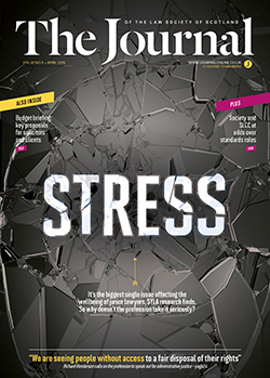Designed for justice
Like many modern cities, Dundee devotes a lot of scarce and expensive resources to its criminal justice system. The results remain the same: repeat offending and the same urban infrastructure that contributes to rising crime rates. It could be argued that the system is failing communities, offenders and professionals in legal services.
A workshop in March sought to explore this and find solutions, bringing together a range of stakeholders: students from law, geography and design; lawyers and justices of the peace; and representatives from the public sector, charities and social enterprises to tackle the issues using design thinking.
“Designs on Justice” was a collaborative event between the Scottish Institute for Enterprise (SIE), Dundee Law School, Duncan of Jordanstone College, and Dundee Touchpoint.
Professor Mike Press, Chair of Policy Design at Duncan of Jordanstone College of Art & Design, and coordinator for Dundee Touchpoint, explains: “Design thinking is already having a transformative effect across areas like healthcare and other public services. Criminal justice is an area that is ripe for a serious rethink of how we approach it, and as the UK’s only UNESCO City of Design, it’s appropriate that Dundee takes the lead on this initiative.”
Design thinking seeks to bring together relevant stakeholders to look at a problem through the same lens, understanding and sharing goals, aspirations and current pain points. The eventual aim is to identify small, achievable starting points to address the issues and disrupt the status quo.
Rather than condoning the actions of those who may break the law, attendees were asked to try to understand all the environmental factors that would lead to that result.
But the workshop also focused on those working with offenders and seeking to make good use of limited resources. By involving a wide range of stakeholders and seeking to, as the organisers intended, “walk in another’s shoes across the board”, attendees looked at the issues in a holistic way.
The workshop was also informed by recent research from the World Economic Forum on the skills needed by graduates in the 21st century. As Ann Davidson, Enterprise Programme Director at SIE, explained: “Graduates now need to have social and cultural awareness, and this is strengthened by involving them in these exciting real life projects.”
One example of an idea that was arrived at collaboratively within the workshop was a social support bus, which would visit areas of Dundee to give advice within communities and tackle social inclusion issues.
Outcomes from the workshop and potential first steps will be showcased at the Dundee International Design Festival in May 2016 and represent an excellent example of how law interacts with other sectors and can help shape society and communities.
In this issue
- Family ADR: why the slow takeup?
- Electronic cigarettes: the medicine of tomorrow?
- Official advice: must do better
- Privacy Shield, the new Safe Harbor
- Maternity: still black marks
- Designed for justice
- Reading for pleasure
- Opinion: Tim Musson
- Book reviews
- Profile
- President's column
- 20 is the new 40
- People on the move
- Stress: the common enemy
- A safer way to talk
- Mind the gap
- SLCC: a role in standards?
- Budget 2016: a spoonful of sugar?
- Rights lost to sight?
- Take care with care services
- How the Sheriff Appeal Court fits in
- Extended liability?
- Periti credere? [Experts believe]
- What's happening on the review
- Scottish Solicitors' Discipline Tribunal
- Deeds of conditions: emerging stronger
- In-house and staying in demand
- Further warning over historic client balances
- Law reform roundup
- Perceptions and priorities
- Training is the key
- Ask Ash
- By diverse means
- The literal truth






